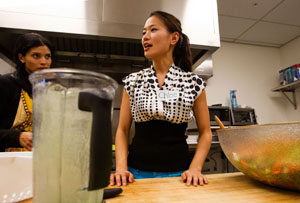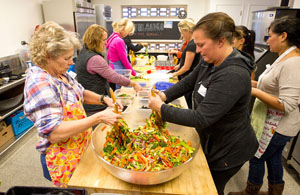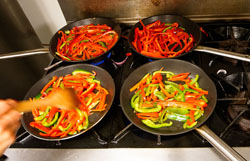January 27, 2014 - By Tracie White

Chloe Chien, who recently earned an MD at Stanford, helps to teach a healthy-cooking class at a Menlo Park community center.
Chloe Chien, MD, went to medical school because she wanted to "comfort, heal and save lives." But last year, the young doctor shocked her family and friends by withdrawing her applications to medical residency programs and instead turning her attention to creating a healthy-cooking course.
"Friends keep asking, 'Don't you want to practice medicine? Don't you want to go back?'" said Chien, who graduated from the School of Medicine in June. "I tell them I'm practicing the best medicine ever. It's preventive, it's inspiring and it's joyful. ... It's so much more impactful than prescribing medicine one patient at a time."
The cooking program, which focuses on making healthy food to lose weight, launched in August. It germinated as a project that Chien and classmate Anna Rakoczy, a former Australian lawyer, worked on in a Stanford Business School class. After the class had ended, they continued developing the project. Now, Stanford employees and other community members can sign up for weekly cooking classes, designed to promote sustainable weight loss through learning about nutrition, using unprocessed ingredients and following healthy recipes. The classes take place in a Menlo Park community center kitchen, and students go home after each session with several days worth of the food they've prepared as a team.
"Telling patients that they need to diet or lose weight is not very helpful," Chien said. "Everybody knows this already."
The program is called Homemade and qualifies as a Stanford Health Improvement course. University employees may use their Staff Training Assistance Program funds and hospital employees can use Educational Assistance funds to cover some of the costs*, and the program has the support of primary care physicians who sometimes refer patients to the class. During the 10-week class, no one gets weighed. It's diet-free, and having fun is encouraged, Chien said.
Preventing problems

In class, students work together to prepare healthy recipes.
The program grew out of Chien's desire to help prevent lifestyle diseases, such as obesity and diabetes.
"I had proposed to work on an obesity/diabetes project and was recruiting team members," said Chien, who took the course while pursuing an MBA at the same time she was enrolled in the School of Medicine. Along with Rakoczy, a few other business students with a similar interest joined the project team, as well as two additional medical students who were also taking the course.
"We were all united by the same passion to effect some kind of primary care reform," Chien said. "It never occurred to me that I would jump ship and do this full time."
At a recent class in Menlo Park, a community center kitchen was filled with adult students wrapped in aprons and wielding large knives. There was a lot of chopping — of brightly colored vegetables, greens, red peppers and garlic — sautéing, stirring and chatting.
"I smelled the class," said Darcy Collet, a mother of three, explaining how she found out about the program. Her daughter takes dance classes down the hall.
"It smelled so good I signed up with my dad," she said. "I do want to lose weight. In the past, I've lost weight too quick and put it back on. With Homemade I've lost 7 pounds in six weeks. And my kids love the food I bring home."
Making food fun

Anna Rakoczy
It's the freshness that makes everything so much more flavorful, the students said. That and the recipes and the variety. The kitchen, filled with cabbages and kale, chicken, eggs and tofu, was warm and cozy. Giant vegetable-filled saucepans sizzled. Blenders of protein-based smoothies whirred, and the group of about 10 students, assisted by instructors and nutritionists, kept busy cooking, laughing and talking.
Chien and Rakoczy, who also holds master's degrees from UC-Berkeley and Stanford law schools, launched Homemade as a business in August — deciding to put their medical and law careers on hold.
"To my knowledge, everyone who has been with us for more than four weeks has lost weight without dieting," Chien said. "They're self-reporting improved blood sugar and blood cholesterol levels. That is thrilling for me. I know how hard it is to control those with medication. They're eating good food, having fun and losing weight without even trying. That blew my mind."
Both Rakoczy and Chien were motivated to develop the program by their own experiences. As a competitive ice skater, Rakoczy struggled with body-image issues and constant dieting. She wanted to empower people to adopt healthy diets.
"I tried all the fad diets, everything," Rakoczy said. "After years of this, I learned that what really works is adopting a healthy eating lifestyle based on cooking your own food so you know what goes into it, eating whole natural foods and listening to your hunger. That's the model we adopted."
Chien was motivated by the senseless pain and suffering caused by preventable diseases that she witnessed first-hand while treating patients.

Peppers are sautéed.
"Throughout med school I became increasingly bothered by lifestyle diseases — chronic conditions, obesity, diabetes, heart conditions," Chien said. "Because they are so morbid, so expensive, so difficult to treat, so demoralizing yet at the same time, preventable."
During her surgery rotation, Chien was particularly struck by the foot amputations of diabetic patients that she assisted with, and further shocked when she realized those were only the beginning of future amputations because these patients were not getting better. In primary care settings, she would find herself nagging patients about weight loss over and over again, and feeling "deflated" when she left the room because the patients just looked more disempowered and demoralized.
"They've tried and failed, and it feels so bad to always be failing," she said.
The struggle
Chien, 28, has never been obese or had a weight problem. She realized that she needed to understand the issue by talking to those who had struggled with their weight. As part of the business school course, she and Rakoczy listened to many patients with chronic diseases caused by obesity and designed their program around what they learned.
"I was totally humbled by this," Chien said. "Most people who are overweight have tried all kinds of diets, all kinds of programs. They told us they were sick and tired of food journaling or calorie counting or no-fat rules. They'd tell us, 'Yeah, I lost weight when I was on a diet, but once I stopped I gained it all back and more.' "
The concept they came up with? Bringing enjoyment back to eating and focusing on creating healthy, tasty meals that become a way of life.
"They have created an extremely novel and promising approach to the obesity problem," said Sang-ick Chang, MD, assistant dean for clinical affairs at the medical school and a clinical professor of medicine. "We are promoting this project to our patients in Stanford Primary Care. It's a fabulous example of the innovation of Stanford students."
Christopher Gardner, PhD, associate professor of medicine at the Stanford Prevention Research Center, added, "After decades of public health messages telling people to choose a healthier diet, and largely failing, Homemade is enabling people to make those choices. What Chloe and Anna have created is inspiring."
The two have collected testimonials from numerous course participants who report positive changes to their total well-being — from weight loss to increased energy to better sleep — since first showing up in the community kitchen.
A different outlook
"I joined with my husband," said Wendy Foad, associate chief nursing officer at Stanford Hospital & Clinics, who signed up for the course in August. "He has lost 27 pounds, and I've lost 23 pounds. I stopped getting indigestion, and reduced the number of migraines I've been getting. I managed to keep off the weight all through the holidays using the skills I have learned so far."
Foad added that most impressive was achieving all this while enjoying herself. "I don't feel stressed about what I'm eating," she said. "I cook it. I enjoy it. And I move on. There's no calorie counting, journals, confessions, guilt. I have a whole new outlook on food and what I eat in a very positive way."
In addition to her training in law and competitive ice skating, Rakoczy also brought cooking skills to the table. She and Chien have together created about 100 different recipes for the class so far. Variety is key, they said, and the recipes reflect that — from entrees like paprika chicken casserole to side dishes like nutty Thai pumpkin soup to sweet treats like tropical mango smoothie with goji berries.
They buy fresh fruit and vegetables wholesale, saving on costs, and have recruited professional nutritionists and chefs to help teach their program.
"I do miss a lot of other parts of medicine and hope to go back to it," Chien said. But for now, she said she's committed to Homemade. "When I pulled out of residency applications my mentors were telling me 'Don't do it; you're crazy,'" Chien said. "At the same time, they were saying 'Can I refer my patients to you?'"
*The cost of the 10-week course is $1,200, including three-days worth of take-home meals each week. (You can take home more meals for an additional cost.) For university employees, as much as $800 in STAP funds can be put toward the course fee. Similar funding is available to hospital employees through the Educational Assistance program. (STAP and EA funds do not cover the cost of the food.) A five-week course option also is available. For more information, visit http://hip.stanford.edu or http://www.homemade-cooking.com.
About Stanford Medicine
Stanford Medicine is an integrated academic health system comprising the Stanford School of Medicine and adult and pediatric health care delivery systems. Together, they harness the full potential of biomedicine through collaborative research, education and clinical care for patients. For more information, please visit med.stanford.edu.